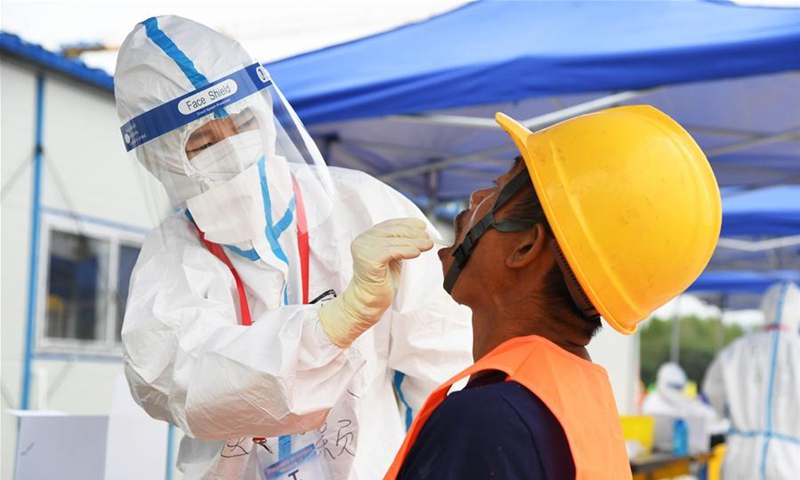7.68 million people received nucleic acid testing in Beijing: health authority
By Zhao Yusha Source:Global Times Published: 2020/6/28 18:03:44
Strict measures help capital curb spread, trace origins: experts

A medical staff member (L) collects a worker's throat swab sample at a COVID-19 nucleic acid testing facility set up temporarily on a construction site in Haidian District of Beijing, capital of China, June 26, 2020. More than 1,750 construction workers in Beijing received COVID-19 nucleic acid tests on Friday. (Xinhua/Ren Chao)
Beijing had taken samples from 8.29 million of its residents as of Sunday, of which 7.68 million completed nucleic acid testing, meaning that 38.4 percent of the capital's total population has been tested for coronavirus.
After confirmed cases in the capital dropped to double-digit numbers within three weeks, health experts announced that Beijing has entered a "control period," where new infections will continue to drop and soon fall to zero as Beijing has already experienced two incubation periods.
The city's massive nucleic testing scale and strict prevention measures have helped round up everyone who needs to be tested.
Zhang Qiang, deputy head of Beijing's special COVID-19 task force, said at a Sunday conference that four key groups should be tested immediately.
First, close contacts - employees and neighbors of Xinfadi market and Yuquandong market. Second, sample collectors at Xinfadi market. Third, employees in the services sectors, such as beauty salons and restaurants, and school returnees. Fourth, people living in key risk areas.
Beijing has entered a "control period" after confirmed cases dropped to double-digit numbers on short notice, Wang Guangfa, a respiratory expert at Peking University First Hospital, told the Global Times.
Unlike Wuhan's city-wide test, which served to answer the question of whether the epidemic area was safe, Beijing's massive testing, which was conducted in an orderly fashion, extended from small groups at Xinfadi market to city-wide key groups. This approach helped curb the spread of the virus and support the effort to trace the origins of the outbreak, said Wang.
More than 100,000 students, faculty and staff at Beijing's universities will have competed nucleic acid testing as of Sunday, after a city-wide COVID-19 testing operation was conducted within 36 hours, involving 20 different medical institutions.
As of Friday, a total of 1.65 million people had taken nucleic acid tests in Beijing's Daxing district. Further, 12,350 out of the city's 26,286 tested beauty salons returned negative test results as of Friday night, media reported.
To satisfy the city's demand for massive COVID-19 sample testing and ensure convenience to residents at the same time, Beijing also plans to deploy mobile equipment to collect samples, such as makeshift COVID-19 testing sites.
Beijing's testing capacity has soared from 40,000 samples on June 11 to maximum of 1.08 million samples per day as of now, said Zhang.
Sample pooling has played a vital role in helping Beijing beef up testing capacity, said officials from the National Health Commission (NHC) on Sunday.
There are two modes of hybrid tests; the first uses pooled samples from three to five people in one tube, whereas the second takes the same volume of samples from three to five people and involves mixing them together.
The first mode has been widely used in Beijing's screening sites, and will not affect the sensitivity of the test, according to the NHC.
But Wang warned that while sample pooling can be used for community scale tests, for close contacts of confirmed cases or even infection cases, single-person testing is necessary as samples are diluted in the pool, and their sensitivity will be affected to some extent.
Currently, if someone tests negative for nucleic acid, it means that they're safe, said Wu Zunyou, chief epidemiologist at the Chinese Center for Disease Control and Prevention. To address public concerns over someone who tested negative but was later confirmed to have contracted the virus, Wu dismissed the possibility of contagion of such groups of people.
"If someone was infected but could not be tested via throat swab, the possibility of passing the virus to others through breath is very slim," said Wu, admitting that more testing methods are necessary for key groups of people.
Beijing's Fengtai district, where Xinfadi is located, plans to conduct both nucleic acid tests and serum antibody tests on people under collective quarantine, said Chu Junwei, Deputy Party Secretary of the district.
The city has also lowered the price for nucleic acid tests from 180 yuan ($26.8) to 120 yuan per person. Du Xing, an official from Beijing's health insurance bureau, said at the press conference that the medical expenses of those who require tests should be shouldered by the government.
Those who want to voluntarily complete the test should have to pay themselves.
Newspaper headline: Beijing tests 38% of residents for virus
RELATED ARTICLES:
Posted in: SOCIETY,FOCUS